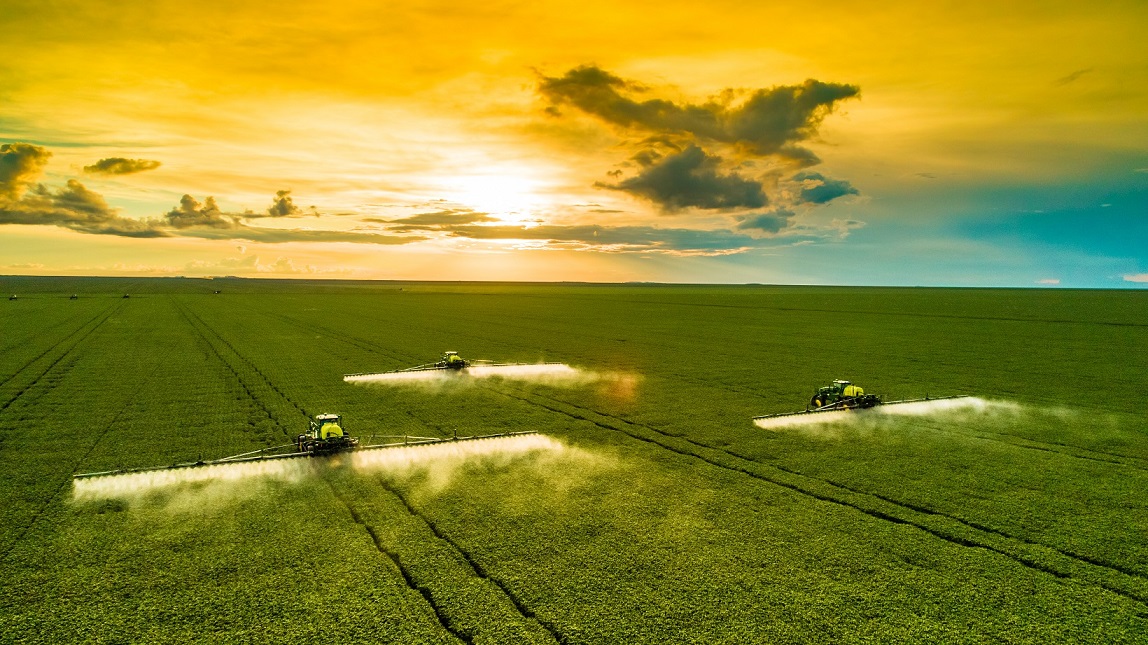
The future of agribusiness is built on a balance beam of challenges and trends.
Hovering just above a neat $5 trillion, global agricultural production’s worth makes up 4% of the global GDP. But that’s just the opening number. What’s missed in this figure is the behind-the-scenes performance by the other stalwarts of the agribusiness sector, like agri-input companies, agricultural machinery manufacturers, and agricultural services providers.
But despite the immense size of this sector, 345 million people across the globe are starving. This stark reality underscores the need for agribusinesses to expand their reach.
And with the world’s population set to reach nine billion in 2037, we’re staring at the daunting task of firing up food production by a whopping 68% come 2050 to keep up. To further complicate things, the growing middle class prefers meat over staples like grains, legumes, and wheat.
Sadly, as the drumbeat of global hunger grows louder, the rhythm of agribusiness production is slowing to a crawl. The 2010s bore witness to global agricultural growth tripping over itself, crashing to a six-decade low. The once booming yield rates for corn, rice, and wheat have been on a downhill ride since their halcyon days in the 70s and 80s.
And then, peeking from behind the curtains, is sustainability—the elephant in the room. Our global food system is the ringleader behind a hefty 26% of the world’s greenhouse gas emissions, with agribusiness—a sector heavily affected by climate change—being a significant contributor.
However, this is all just the tip of the iceberg. So, let’s dive deeper.
Challenges in the Agribusiness Sector
The agribusiness sector grapples with distinct challenges. While these challenges largely hinge on the geographical areas where an agribusiness organization functions, there are a few universally common issues.
Climate Change
As the earth’s thermostat continues its relentless climb, the world of agricultural production and global food security are set to face an unprecedented test of resilience.
Businesses in the sun-soaked regions of North Africa will find themselves wrestling with dwindling yields, while farmers will grapple with capricious revenues and the looming specter of crop failure. Regions currently teetering on the brink of food insecurity, like Sub-Saharan Africa, and areas parched by water scarcity, like India, will bear the brunt of this challenge.
Sustainability Pressures
The call for amplified sustainability in agribusiness is set to shake the very foundations of conventional practices.
Those in the eye of the storm will be existing businesses whose strategies are out of sync with global climate goals, sectors with colossal carbon footprints such as beef livestock, and markets vulnerable to the rising tide of consumer climate consciousness—palm oil springs to mind.
Slowing Productivity
The deceleration of agricultural productivity growth is casting ominous shadows over global food security.
Those facing the firing line are agribusiness sectors heavily reliant on carbon-intensive inputs, regions witnessing explosive population growth like Sub-Saharan Africa, areas scarred by rapid soil erosion or severe degradation, and sectors thriving on deforestation and land degradation for increased output.
Labor Shortages
The ticking time bomb of aging populations and waning interest in agricultural vocations is set to trigger labor shortages in the sector.
This will push farmers into a corner, compelling them to dangle the carrot of higher wages to lure workers. Paradoxically, labor shortages will also lead to a surge in crop wastage, nudging prices northward.
Rising Input Costs
The relentless upward march of input costs is dramatically reshaping the face of modern farming.
Fertilizers, pesticides, machinery, and labor costs—everything’s skyrocketing. Case in point, fertilizer prices leaped by 30% in 2022, hot on the heels of an 80% jump in 2021, a consequence of supply disruptions due to sanctions, export restrictions, and curtailed European ammonia production.
Feed prices followed suit in 2022, propelled by increasing fertilizer costs and feed shortages triggered by the Ukraine-Russia crisis.
Consequently, farmers are pivoting towards precision agriculture, leveraging data-driven technologies like satellite imagery, drones, and sensors to optimize inputs, minimize waste, and trim costs.

Future Trends and Opportunities in the Agribusiness Sector
Like all facets of life, every challenge should inspire the question, “what corresponding opportunity does this present?”
For instance, climate change, while a significant hurdle, might unveil opportunities like innovative agricultural business models or biofuel.
New Agricultural Business Models
The agribusiness landscape is turning a new leaf towards climate-friendly practices, paving the way for innovative entrants, technologies, and business models.
Early market entrants like AeroFarms, urban-vertical farming gurus harnessing aeroponics, and Hello Tractor, creators of a tractor-sharing app for African farmers, are already capitalizing on these eco-conscious business models.
Water-Wise Agriculture
The world is getting drier. Water is getting scarcer. Farmers will need to come up with a new plan—the future of farming can’t be water intensive.
This means that farmers need to reconsider their irrigation strategies. Agribusinesses like Netafim are set to play a large role. Netafim is an Israeli company that specializes in drip irrigation technology. Its irrigation technology can not only increase yield, but also saves a substantial amount of water when compared to traditional irrigation models.
New Crop Varieties
Our changing climate, water scarcity, and the imperative to significantly boost crop production all point to a common need: the development of new crop varieties capable of withstanding these challenges while producing enough yield to justify cultivation.
That is where companies like East-West Seeds step in. East-West Seeds is a leader in the production of vegetable seeds tailored for tropical climates. These seeds are not only resilient in the face of our evolving world but also cater to the preferences of vegetable consumers within their respective markets.
At EWS, we firmly believe that innovation and our capacity to develop new varieties better suited to arid conditions, requiring less water, and offering enhanced resistance to pests, are integral to our evolution and our commitment to supporting smallholder farmers.
— JC Filippi, CEO of East-West Seeds
Sustainable Livestock Feed
One cow belches out a whopping 220 pounds (almost 100 kilograms) of methane annually. That’s a massive climate change culprit, and you don’t need to be a scientist to see it’s unsustainable.
But organizations like the Commonwealth Scientific and Industrial Research Organisation (CSIRO), an Australian government agency, are stepping up. CSIRO has produced a seaweed-based cattle feed supplement that contains bromoform which prevents the formation of methane in the cow’s gut.
Sustainable Fertilizer
Seaweed isn’t just beneficial for reducing methane emissions from cows; it’s also a boon for plants. Instead of resorting to chemical fertilizers with a significant carbon footprint, farmers can opt for natural fertilizers.
Companies like Kelpak in South Africa and Algea in Norway manufacture and sell seaweed-based fertilizers, offering farmers an opportunity to reduce their environmental impact. AlgaEnergy, a Spanish company, produces agricultural biostimulants from microalgae too.
Biofuel
In the near future, an increasing land share will be dedicated to biofuel feedstock production.
Pioneers in this arena include Celtic Renewables, which innovatively turns whisky residues into biofuel, and Agrivida, leading the charge in enzyme technology for biofuel production from non-food crops.
Labor Automation
With labor shortages becoming a persistent challenge, automation is the new darling of the agribusiness sector.
Companies like Bear Flag Robotics, with its autonomous technology for tractors, and Naio Technologies, with its unique robots designed for various farming tasks, are leading the way.
Green Pest Control and Pollination
Farmers need effective pest control and pollination for crop growth, but traditional pesticides not only generate ground-level ozone, a greenhouse gas, during application, but also contribute to greenhouse gas emissions during manufacturing and transportation. These pesticides also pose a threat to bees, crucial pollinators whose populations are dwindling due to climate change, with nearly half of US honeybee colonies dying last year.
But companies like Koppert Global may be able to save the day. Koppert Global provides a range of eco-friendly options to farmers, including buff-tailed bumblebees and common green bottleflies for crop pollination and a variety of beneficial insects, like predatory mites and nematodes, which dine on pests that threaten crops.
Diversification and Niche Markets
To counteract fluctuating commodity markets and escalating costs, farmers are increasingly diversifying and targeting niche markets.
Companies like Full Harvest, a B2B platform that also sells excess produce, Bowery Farming, an indoor vertical farming company offering clean, sustainable, and locally grown produce, and Farmhouse Culture, meeting the rising demand for fermented foods, exemplify the advantages of this approach.
Alternative Energy Sources
With fuel prices being a significant concern, agricultural businesses are investing in renewable energy resources.
Sundrop Farms leads the way in using solar power for diverse farming operations and Smithfield Foods is converting hog manure into renewable natural gas.

Value-Added Processing
Farmers are increasingly engaging in on-farm processing and manufacturing to secure a larger share of the value chain.
Blue Diamond Growers transforms almonds into a range of value-added products. The Tillamook County Creamery Association converts milk into diverse dairy products.
Improved Ag-Tech
Digital transformation in agriculture is encouraging farmers to adopt cutting-edge ag-tech solutions.
For example, The Yield, an Australian ag-tech company, assists farmers in determining when to plant, when to apply pesticides, when to harvest, and provides a wealth of other crucial information through a user-friendly app. This app compiles real-time data and employs artificial intelligence to deliver location-specific insights tailored to the farmer’s area.
Collaborative Networks
Farmers won’t be able to survive all the coming changes alone. They’ll need to work collaboratively with agribusinesses in order to succeed.
Companies like Farmobile are already enabling a whole new level of collaboration. Farmobile leverages technology to assist farmers in collecting, storing, and selling vital farm data.
How to Prepare Your Agribusiness for the Future
Change is not just on the horizon; it’s here, knocking at the door of every agribusiness. Prepare to welcome it, adapt, and evolve, or face the risk of being outpaced by those who do.
The compass guiding this transformation? Robust leadership—a precious commodity that’s often in short supply, given the unique skillset required.
The winds of change won’t wait for readiness; they blow regardless. What agribusinesses need now are top leaders—not just any leaders, but those imbued with creativity and innovation, open-mindedness, and adaptability. Leaders unafraid to play the game of risk, driving change rather than merely reacting to it.
What agribusinesses need now are top leaders—not just any leaders, but those imbued with creativity and innovation, open-mindedness, and adaptability.
That’s where Stanton Chase comes in. With a rich legacy spanning over three decades and a global network at our disposal, we are adept at identifying the linchpins who can drive your agribusiness forward. Our services promise an ideal executive match for your company’s unique culture and operational needs.
If you need assistance in finding an agribusiness leader to help you secure a successful future, don’t hesitate to reach out to our consultants.
About the Author
Fiona Lavan is a Managing Director at Stanton Chase Australia. She has been in executive search since 1988 and became an equity partner of Stanton Chase in 1998. She was appointed to the International Board as Vice Chair Regions and Regional Vice President Asia Pacific in 2011, roles she held until the end of 2014. She returned to the International Board from 2019 – 2021 and is now Global Sector Leader for Agribusiness.
Fiona’s professional background is in investment banking, having spent several years in both corporate banking and international treasury with Australian, Japanese, and British banks. She is a graduate of Monash University in Human Resource Management and Industrial Relations.
How Can We Help?
At Stanton Chase, we're more than just an executive search and leadership consulting firm. We're your partner in leadership.
Our approach is different. We believe in customized and personal executive search, executive assessment, board services, succession planning, and leadership onboarding support.
We believe in your potential to achieve greatness and we'll do everything we can to help you get there.
View All Services